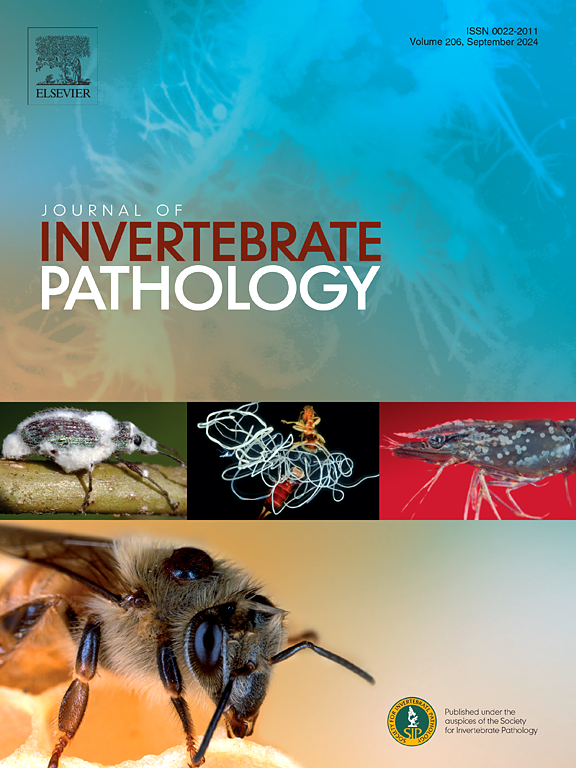Infection of two cestode larvae, Nybelinia enterika sp. nov. and Phoreiobothrium sp. in oval squid Sepioteuthis lessoniana species complex
IF 3.6
3区 生物学
Q1 ZOOLOGY
引用次数: 0
Abstract
Recently, oval squid of Sepioteuthis lessoniana species complex has gained importance in aquaculture due to its successful breeding in semi-intensive and intensive aquaculture systems. However, there is a lack of information regarding pathogens and diseases that can affect this species, prompting the need for further research. Two cestode species, Nybelinia enterika sp. nov. and Phoreiobothrium sp., were identified as members of the Trypanorhyncha and Onchoproteocephalidea orders, respectively, using both morphological and molecular diagnostic markers in wild-caught oval squids (Sepioteuthis lessoniana sp.1, S. lessoniana sp.2, S. lessoniana sp.3). These cestode species were found to use the oval squids as intermediate hosts. In histopathology samples, the infected squid with N. enterika was surrounded by numerous hemocytes in the infected area. In the genomes of both cestode species, we identified multiple genes for enzymes involved in cephalopod tissue degradation, such as cysteine proteases including cathepsin-L, cathepsin-D, cathepsin-A, cathepsin-B, cathepsin-K, and cathepsin-S. These enzymes potentially help the parasites manipulate the squid immune system and neutralize squid hemocytes. The detection of these parasites in wild squid populations, with 100% prevalence in Okinawa, is concerning as the effect of these parasites on human consumers’ health remains unknown. However, our research demonstrated that fully cultured squid remain completely cestode parasite-free, indicating they are more likely to meet the highest standards for food safety and quality.

卵形鱿鱼两种幼虫enterbelinia sp. 11和Phoreiobothrium sp.的感染
最近,由于在半集约化和集约化水产养殖系统中的成功养殖,Sepioteuthis lessoniana 种群中的椭圆形鱿鱼在水产养殖中变得越来越重要。然而,有关可能影响该物种的病原体和疾病的信息还很匮乏,因此需要进一步研究。利用形态学和分子诊断标记,在野生捕捞的椭圆形鱿鱼(Sepioteuthis lessoniana sp.1、S. lessoniana sp.2、S. lessoniana sp.3)中鉴定出两个绦虫物种,Nybelinia enterika sp.研究发现,这些绦虫物种以椭圆形鱿鱼为中间宿主。在组织病理学样本中,感染 N. enterika 的鱿鱼被感染区域的大量血细胞包围。在这两种绦虫的基因组中,我们发现了多种参与头足类组织降解的酶基因,如半胱氨酸蛋白酶,包括 cathepsin-L、chepsin-D、chepsin-A、chepsin-B、chepsin-K 和 cathepsin-S。这些酶可能有助于寄生虫操纵乌贼的免疫系统,中和乌贼的血细胞。在野生乌贼种群中检测到这些寄生虫(在冲绳的感染率高达 100%)令人担忧,因为这些寄生虫对人类消费者健康的影响仍是未知数。然而,我们的研究表明,完全养殖的鱿鱼完全不含绦虫寄生虫,这表明它们更有可能达到食品安全和质量的最高标准。
本文章由计算机程序翻译,如有差异,请以英文原文为准。
求助全文
约1分钟内获得全文
求助全文
来源期刊
CiteScore
6.10
自引率
5.90%
发文量
94
审稿时长
1 months
期刊介绍:
The Journal of Invertebrate Pathology presents original research articles and notes on the induction and pathogenesis of diseases of invertebrates, including the suppression of diseases in beneficial species, and the use of diseases in controlling undesirable species. In addition, the journal publishes the results of physiological, morphological, genetic, immunological and ecological studies as related to the etiologic agents of diseases of invertebrates.
The Journal of Invertebrate Pathology is the adopted journal of the Society for Invertebrate Pathology, and is available to SIP members at a special reduced price.

 求助内容:
求助内容: 应助结果提醒方式:
应助结果提醒方式:


